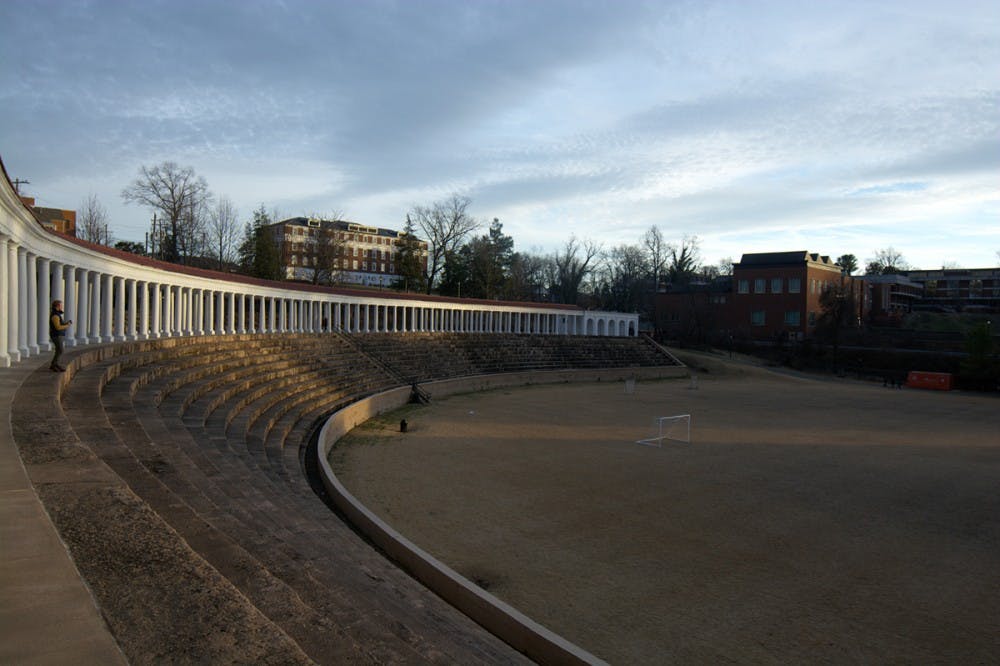This semester, it seems as though some of the most impactful news stories about the University have related to the use of space on its historic Grounds. At the end of last year, the University began a long-slated project to increase on-Grounds housing options for upperclassmen by demolishing existing buildings on Brandon Avenue to build a new residence hall. Students returned to Grounds to find increased construction in this area. The goal of the project is to offer more student housing in a highly-trafficked area in order to entice upperclassmen to continue living on-Grounds.
Additionally, the University reviewed another land-use issue related to the construction of a new stadium for the softball team. The plan — which has now been removed from the list of possible options — proposed that Lambeth Field be turned into a stadium and that the Lambeth Residence Area parking lot be converted to green space. The field and the optimally located parking lot are both attractions for students seeking to live in on-Grounds housing, and the initial decision to repurpose the space is at odds with the University’s student housing goals. The University’s consideration of Lambeth Field as a possible location for its new softball stadium represents a disconnect between the desire to shore up on-Grounds student housing and the desire to develop Grounds.
If the University administration had a true desire to improve its on-Grounds housing options, it would not have nearly accepted a proposal to diminish the quality of one of its longest-standing on-Grounds housing options. Though the Lambeth Field Residence Area is not new, it is still attractive to students who are looking to stay on-Grounds for at least a year and who want to live closer to Central Grounds. In comparison to other upperclass on-Grounds housing options like Faulkner or Copeley, Lambeth is much more central and offers a large and affordable parking area. The residence area is also centered around the large field that the University sought to remove. The space is widely used by students and community members and is historically significant, as it was the original location of the University’s football stadium.
As it stands, selling students on University housing is becoming more and more difficult, with many students choosing to move off-Grounds after their first year at the University. The new upperclass housing development on Brandon Avenue is not scheduled to open until Fall 2019, so in the meantime, the University must seek to make all other on-Grounds housing options as attractive as possible. Lambeth Field Residence Area derives much of its value from the amenities surrounding it, including the field and the economical parking. By considering the removal of two major selling points of the residence area, the University has shown that its commitment to on-Grounds housing is transient.
Though the University’s administration states that it is committed to increasing its on-Grounds housing presence, its actions in the softball field construction debate undercut its commitment. Lambeth Field was considered one of the best options for the new softball field location, but if the University was as committed to on-Grounds housing as it says it is, its administrators would have realized the downsides of the plan from the beginning. Though they planned to build a new green space for Lambeth residents as a substitute for the loss of the field, the new space would be built at the expense of Lambeth’s convenient parking area. A new space would also lack the historical significance of the current Lambeth Field area.
As it stands, the University’s lack of commitment to upperclassmen housing is an important issue for students because it shows some inconsistency on behalf of the administration. The University states that it wants to offer second, third and fourth-year students better options for housing, but at the first available opportunity, it nearly accepted a proposal to decrease the value and amenities of one of the few, convenient on-Grounds housing options for upperclassmen. The plan to build a softball field at the Lambeth Field Residence Areas uncovered a lack of dedication to the University’s existing on-Grounds housing options and, if the University expects students to develop enthusiasm about on-Grounds housing, it must show universal support for its own facilities. The new development on Brandon Avenue is certainly a step in the right direction, but the University could both demonstrate its commitment to on-Grounds housing and increase student interest in these units by selling students on the amenities of Lambeth Field, rather than seeking to remove them.
Carly Mulvihill is an Opinion columnist for The Cavalier Daily. She can be reached at c.mulvihill@cavalierdaily.com.







